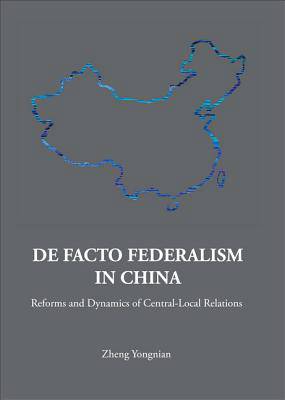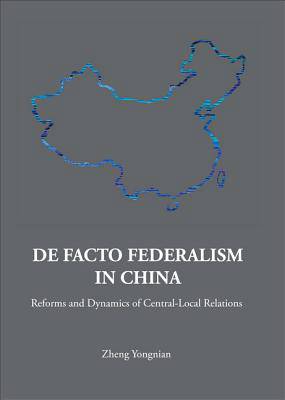
Door een staking bij bpost kan je online bestelling op dit moment iets langer onderweg zijn dan voorzien. Dringend iets nodig? Onze winkels ontvangen jou met open armen!
- Afhalen na 1 uur in een winkel met voorraad
- Gratis thuislevering in België vanaf € 30
- Ruim aanbod met 7 miljoen producten
Door een staking bij bpost kan je online bestelling op dit moment iets langer onderweg zijn dan voorzien. Dringend iets nodig? Onze winkels ontvangen jou met open armen!
- Afhalen na 1 uur in een winkel met voorraad
- Gratis thuislevering in België vanaf € 30
- Ruim aanbod met 7 miljoen producten
Zoeken
de Facto Federalism in China: Reforms and Dynamics of Central-Local Relations
Yongnian Zheng
€ 249,95
+ 499 punten
Omschrijving
This book is the first attempt to conceptualize China's central-local relations from the behavioral perspective. Although China does not have a federalist system of government, the author believes that, with deepening reform and openness, China's central-local relations is increasingly functioning on federalist principles.Federalism as a functioning system in China is under studied. The author defines the political system existing in China as "de facto federalism", and provides a detailed analysis of its sources and dynamics in the book. The system is mainly driven by two related factors -- inter-governmental decentralization and globalization. While economic decentralization since the 1980s has led to the formation of de facto federalism, globalization since the 1990s has accelerated this process and generated increasingly high pressure on the Chinese leadership to institutionalize de facto federalism by various measures of selective recentralization.
Specificaties
Betrokkenen
- Auteur(s):
- Uitgeverij:
Inhoud
- Aantal bladzijden:
- 460
- Taal:
- Engels
- Reeks:
- Reeksnummer:
- nr. 7
Eigenschappen
- Productcode (EAN):
- 9789812700162
- Verschijningsdatum:
- 24/01/2007
- Uitvoering:
- Hardcover
- Formaat:
- Genaaid
- Afmetingen:
- 236 mm x 160 mm
- Gewicht:
- 792 g

Alleen bij Standaard Boekhandel
+ 499 punten op je klantenkaart van Standaard Boekhandel
Beoordelingen
We publiceren alleen reviews die voldoen aan de voorwaarden voor reviews. Bekijk onze voorwaarden voor reviews.











